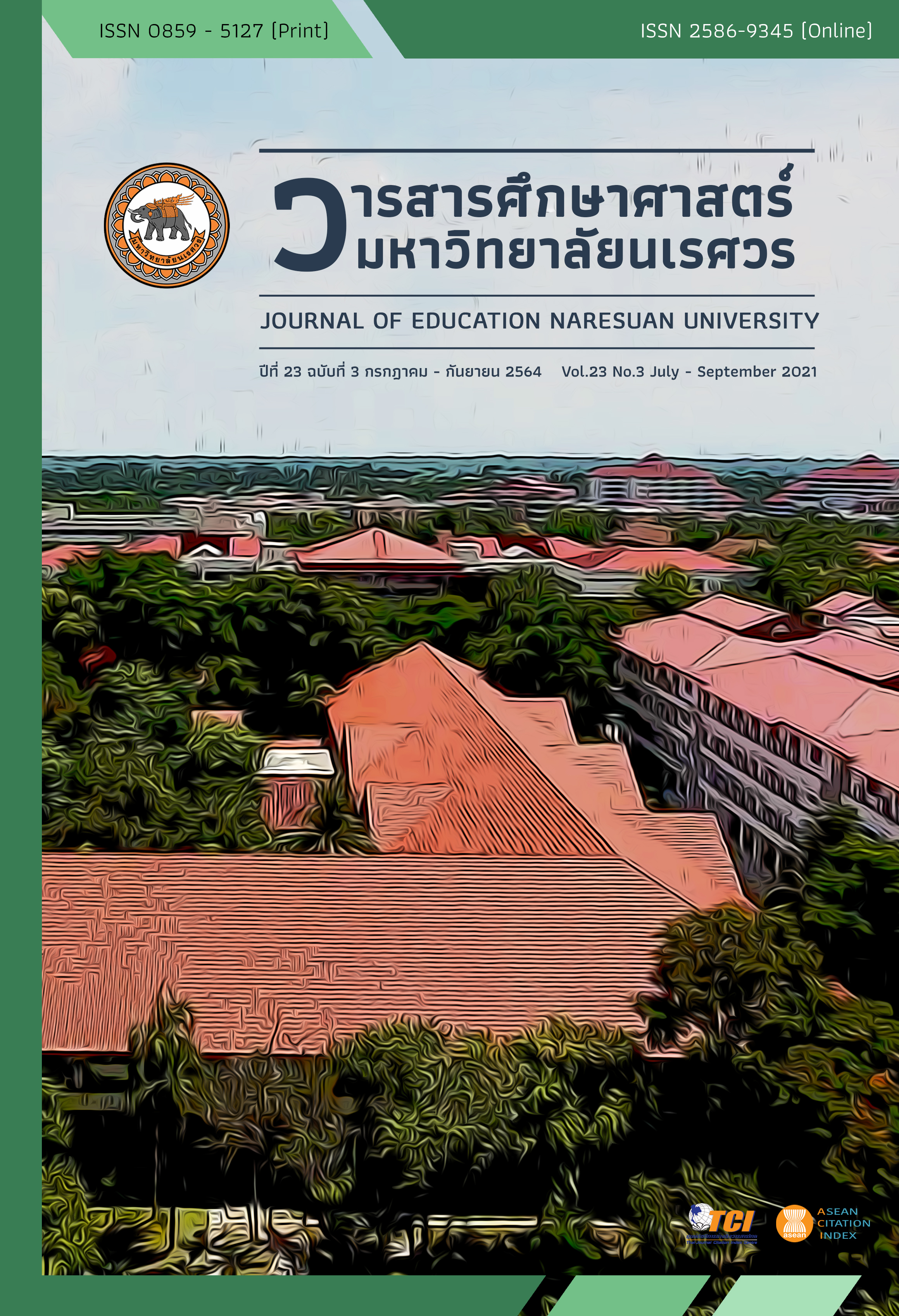THE EFFECTIVENESS OF THE GROUPS MODEL IN ENHANCING THE STUDENT’S ENGLISH COMMUNICATION SKILL AT KAMPHAENG PHET RAJABHAT UNIVERSITY, MAESOT
Main Article Content
Abstract
This study aimed to investigate the effectiveness of the GROUPS model in enhancing the student’s English communication skill and to identify the satisfaction levels of students towards the GROUPS Model at Kamphaeng Phet Rajabhat University, Maesot. The subjects were 92 students in four different majors, including 24 Business Computer students, 24 English students, 32 Technology Computer students, and 12 General Management students via simple random at Kamphaeng Phet Rajabhat University, Maesot. The research instruments were achievement tests, assessment tests, an observation, a focus group interview, and a satisfaction form. Quantitative data were analyzed using descriptive statistics, mean and standard deviation, while content analysis was applied for qualitative analysis. The findings were as follows. 1) Regarding the GROUPS model assessment, the achievement t-test scores of pre-test and post-test average mean score were 8.93 and 19.63, while both learning units and individual major assessment in overall pre-test was at “Need to improve” and post-test was at “Excellence.” 2) Regarding the English performance assessment, the achievement t-test scores of pre-test and post-test average mean scores were at 11.91 and 21.85 while learning units and individual major assessment in overall pre-test was at “Fair” and post-test was at “Good.” 3) Regarding the students’ self-assessment overall pre-test was at “Least” and post-test was at “Moderate.” 4) In terms of the students’ behavior observation by checklist, by the groups and the individual were at “Less” at the 1st time and “Moderate” at the 2nd time while the 3rd time, the groups were at “High” and the individual was at “Moderate.” In addition, the students’ behavior observation was in a positive manner. 5) The focus group interview showed that the processes were clear in detail and enabled the students to develop their English communication skills. 6) Regarding the students’ satisfaction with the GROUPS model overall, it was at “Highest.”
Article Details
The owner of the article does not copy or violate any of its copyright. If any copyright infringement occurs or prosecution, in any case, the Editorial Board is not involved in all the rights to the owner of the article to be performed.
References
Fathma, A., & Xiao-hua, H. (1985). Chinese EFL Students' Learning Strategies for Oral Communication. TESOL Quarterly, 19, 167-168.
Gillette, B. (1987). Two successful language learners: An introspective approach. In C. Færch & G. Kasper (Eds.), Introspection in second language research (pp. 268-279). Clevedon, England: Multilingual Matters.
Jung, S. K. (2011). Demotivating and demotivating factors in learning English: A case of low-level college students. English Teaching, 66(2), 47-72.
Lee, E., & Park, M. (2008). Student presentation as a means of learning English for upper intermediate to advanced level students. Journal of Pan Pacific Association of Applied Linguistics, 2(1), 47-60.
Nambiar, Radha M., K., Nor, N. M., Ismail, K., & Adam, S. (2017). New learning spaces and transformations in teacher pedagogy and student learning behavior in the language learning classroom. 3L: The Southeast Asian Journal of English Language Studies, 23(4), 29–40.
Ölmezer Öztürk, E., & Ok, S. (2014). Motivational behaviors of teachers in Turkish EFL classes: Perception of students. Journal of Language and Linguistic Studies, 10(2), 120-133.
Panyawong-Ngam, L., Tangthong, N., & Anunvrapong, P. (2015). A model to develop the English proficiency of engineering students at Rajamangala University of Technology Krungthep, Bangkok, Thailand. Procedia - Social and Behavioral Sciences, 192, 77–82. doi: 10.1016/j.sbspro.2015.06.012
Partnership for 21st Century Skills. (2009). Framework for 21st century learning. Retrieved from http://www.p21.org/about-us/p21-framework
Phansrisuwan, C., & Adipattaranan, N. (2018). Using of communicative activity to develop English listening-speaking skills and self-confidence of Mathayomsuksa 3 students. Journal of Education Naresuan University, 20(2), 47-57.
Preedeekun, A. (2011). The development of a listening and speaking English skills instructional model based on communicative approach and brain-based learning principles to enhance communicative competence of Rajabhat University students (Doctoral dissertation). Phitsanulok: Naresuan University.
Sahin, M. C. (2009). Instructional design principles for the 21st century learning skills. Procedia– Social and Behavioral Sciences, 1(1), 1464-1468.
Serbjit, L. (2013). The development of indicators for teachers competency in 21st century office of the basic education commission (Doctoral dissertation). Maha Sarakam: Rajabhat Maha Sarakam University.
Swatevacharkul, R. (2016). Readiness for autonomous English learning and learning achievement of EP students. Journal of Education Naresuan University, 18(1), 22-32.
Teng, B., & Sinwongsuwat, K. (2015). Teaching and learning English in Thailand and the integration of conversation analysis (CA) into the classroom. English Language Teaching, 8(3), 13-20.
Unokphan, J., Suksai, P., & Onthanee, A. (2018). A development of brain-based leaning activity to enhance English communication ability and happiness in learning for grade 6 students. Journal of Education Naresuan University, 20(3), 35-48.
Yolsook, M. (2008). The development of English communicative learning activities for Mathayomsuksa 6 Students at Phukradung Wittayakom School under the Office of Loei Educational Service Area 2 (Master thesis). Loei: Loei Rajabhat University.


